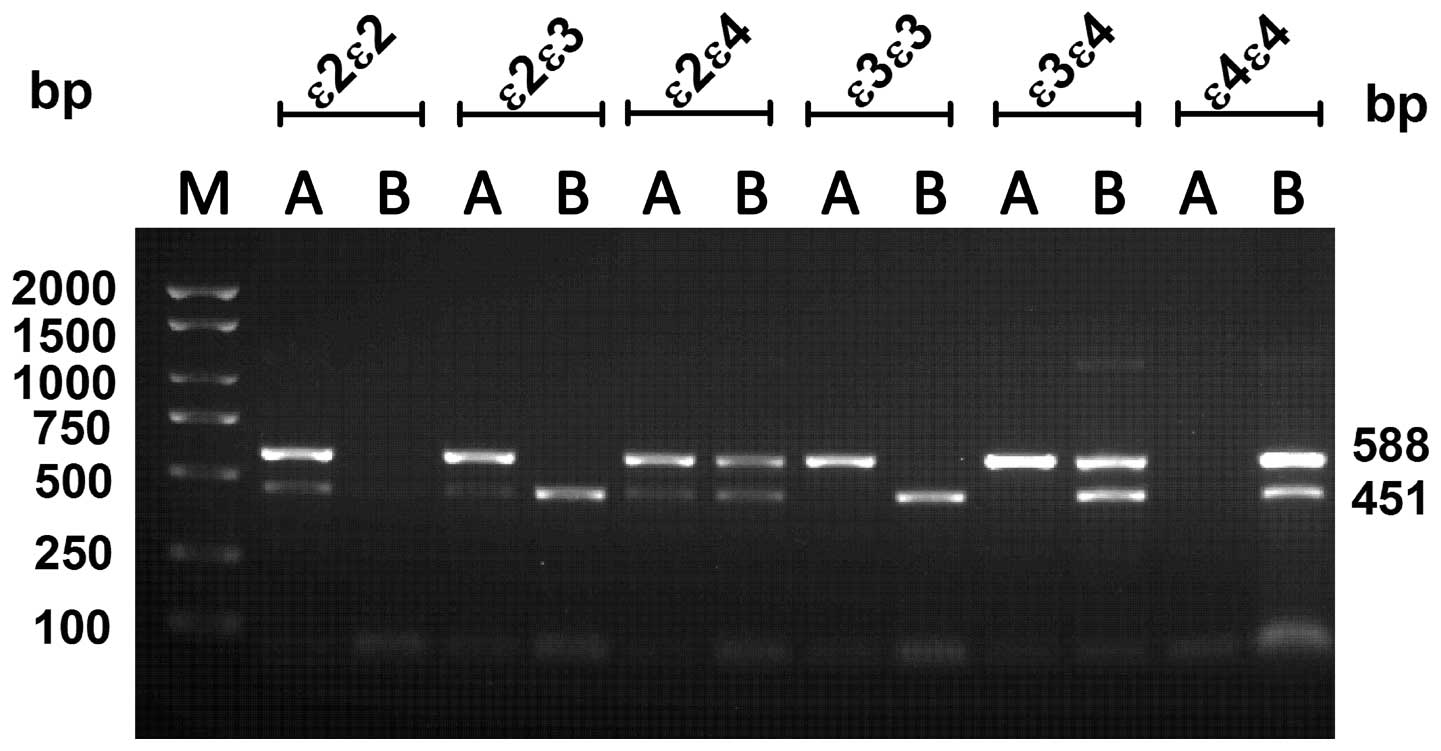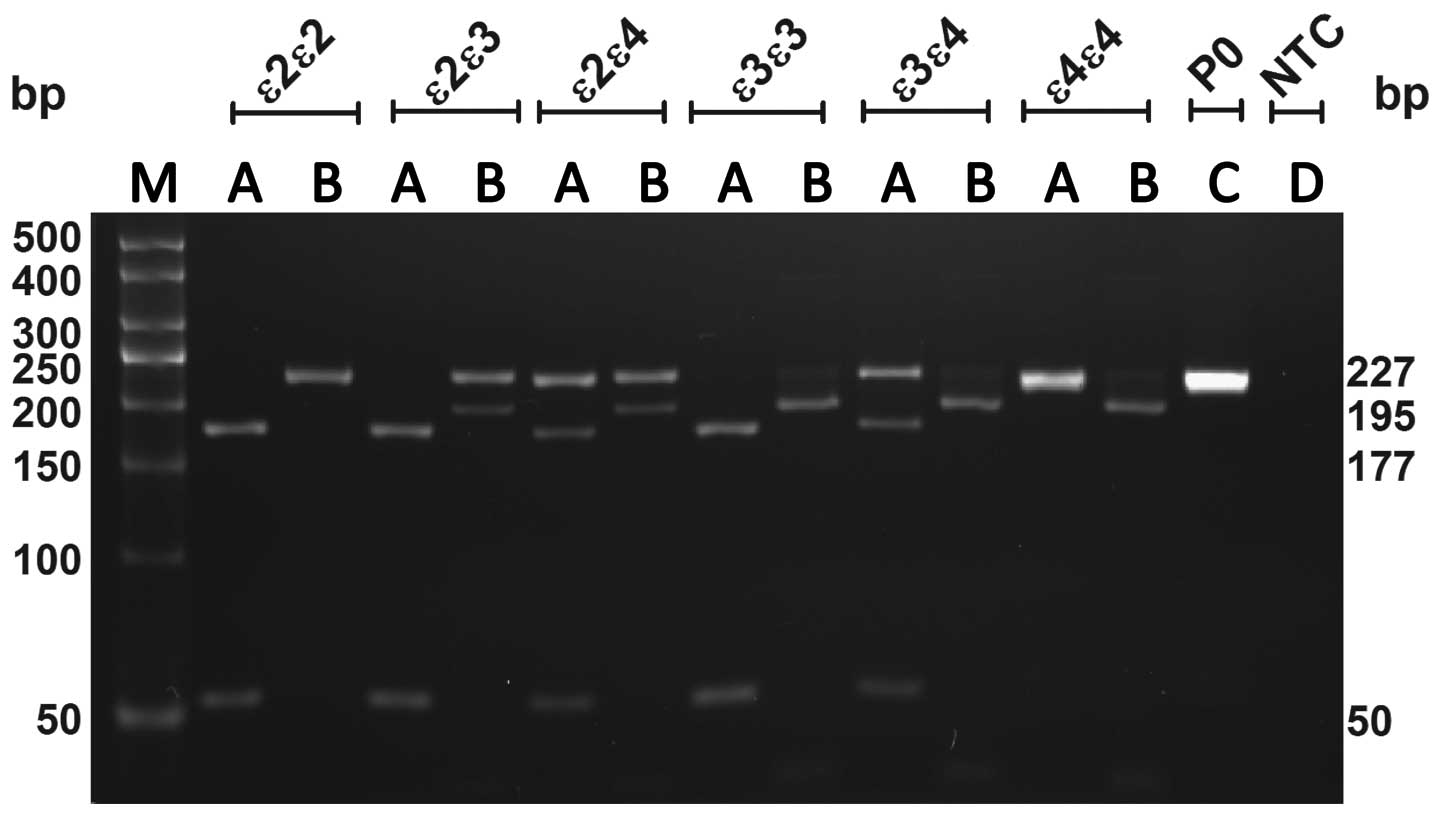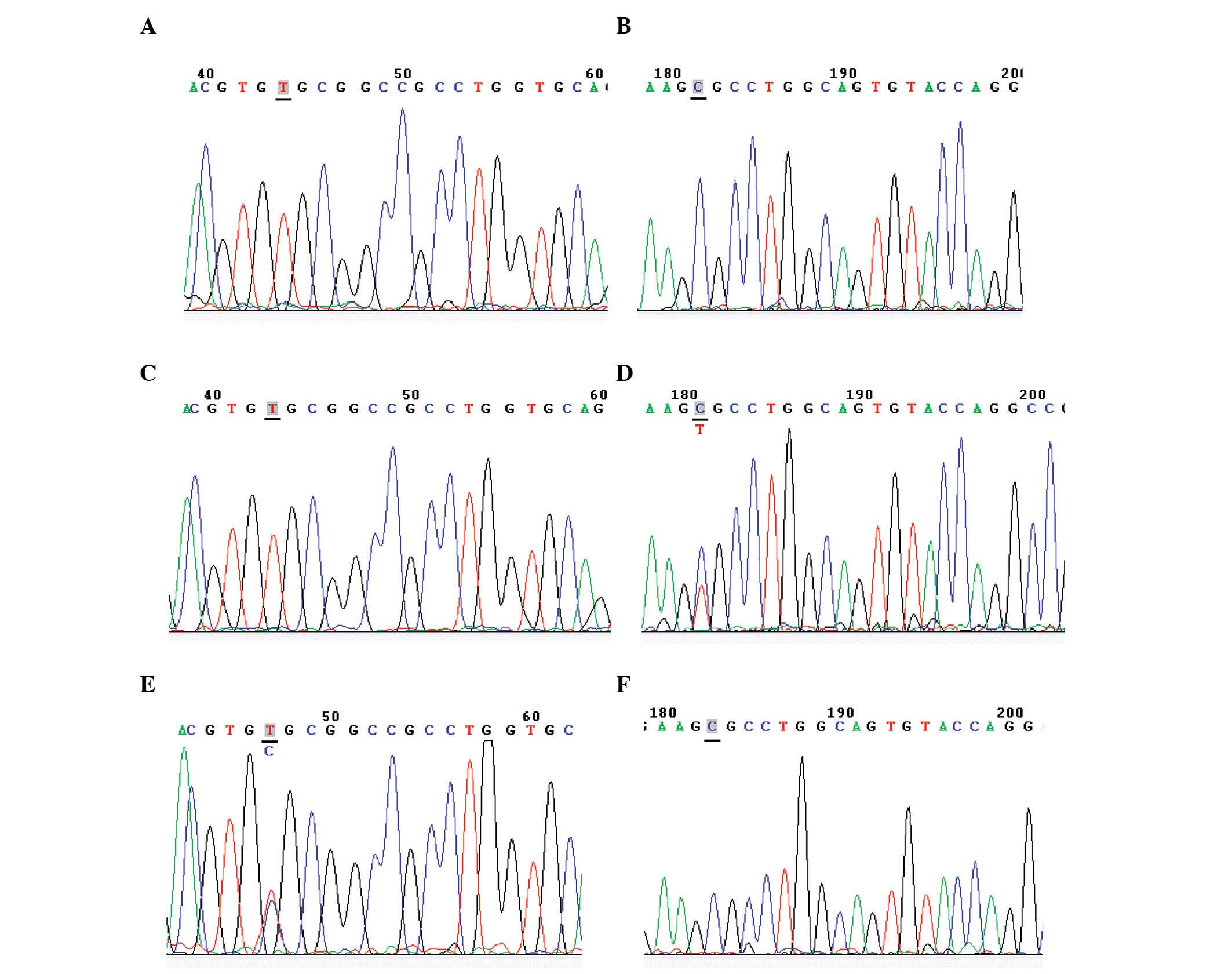|
1
|
Bakish D: New standard of depression
treatment: Remission and full recovery. J Clin Psychiatry. 62(Suppl
26): 5–9. 2001.
|
|
2
|
López-León S, Janssens AC,
González-Zuloeta Ladd AM, Del-Favero J, Claes SJ, Oostra BA and van
Duijn CM: Meta-analyses of genetic studies on major depressive
disorder. Mol Psychiatry. 13:772–785. 2008. View Article : Google Scholar
|
|
3
|
Ramachandran G, Marder K, Tang M,
Schofield PW, Chun MR, Devanand DP, Stern Y and Mayeux R: A
preliminary study of apolipoprotein E genotype and psychiatric
manifestations of Alzheimer's disease. Neurology. 47:256–259. 1996.
View Article : Google Scholar : PubMed/NCBI
|
|
4
|
Willnow TE: The low-density lipoprotein
receptor gene family: Multiple roles in lipid metabolism. J Mol Med
(Berl). 77:306–315. 1999. View Article : Google Scholar
|
|
5
|
Das HK, McPherson J, Bruns GA,
Karathanasis SK and Breslow JL: Isolation, characterization, and
mapping to chromosome 19 of the human apolipoprotein E gene. J Biol
Chem. 260:6240–6247. 1985.PubMed/NCBI
|
|
6
|
Emi M, Wu LL, Robertson MA, Myers RL,
Hegele RA, Williams RR, White R and Lalouel JM: Genotyping and
sequence analysis of apolipoprotein E isoforms. Genomics.
3:373–379. 1988. View Article : Google Scholar : PubMed/NCBI
|
|
7
|
Utermann G, Langenbeck U, Beisiegel U and
Weber W: Genetics of the apolipoprotein E system in man. Am J Hum
Genet. 32:339–347. 1980.PubMed/NCBI
|
|
8
|
Cartier R and Sassolas A: Apolipoprotein E
phenotyping by isoelectric focusing in immobilized pH gradients and
silver staining. Electrophoresis. 13:252–257. 1992. View Article : Google Scholar : PubMed/NCBI
|
|
9
|
Hixson JE and Vernier DT: Restriction
isotyping of human apolipoprotein E by gene amplification and
cleavage with HhaI. J Lipid Res. 31:545–548. 1990.PubMed/NCBI
|
|
10
|
Srinivasan JR, Kachman MT, Killeen AA,
Akel N, Siemieniak D and Lubman DM: Genotyping of apolipoprotein E
by matrix-assisted laser desorption/ionization time-of-flight mass
spectrometry. Rapid Commun Mass Spectrom. 12:1045–1050. 1998.
View Article : Google Scholar : PubMed/NCBI
|
|
11
|
Ben-Avi L, Durst R, Shpitzen S,
Leitersdorf E and Meiner V: Apolipoprotein E genotyping: Accurate,
simple, high throughput method using ABI Prism SNaPshot Multiplex
System. J Alzheimers Dis. 6:497–501. 2004.PubMed/NCBI
|
|
12
|
Aozaki R, Kawaguchi R, Ogasa U, Hikiji K,
Kubo N and Sakurabayashi I: Rapid identification of the common apo
E isoform genotype using polymerase chain reaction-single strand
conformation polymorphism (PCR-SSCP). Mol Cell Probes. 8:51–54.
1994. View Article : Google Scholar : PubMed/NCBI
|
|
13
|
Nauck M, Hoffmann MM, Wieland H and März
W: Evaluation of the Apo E genotyping kit on the LightCycler. Clin
Chem. 46:722–724. 2000.PubMed/NCBI
|
|
14
|
Donohoe GG, Salomäki A, Lehtimäki T,
Pulkki K and Kairisto V: Rapid identification of apolipoprotein E
genotypes by multiplex amplification refractory mutation system PCR
and capillary gel electrophoresis. Clin Chem. 45:143–146.
1999.PubMed/NCBI
|
|
15
|
Chapman J, Estupiñan J, Asherov A and
Goldfarb LG: A simple and efficient method for apolipoprotein E
genotype determination. Neurology. 46:1484–1485. 1996. View Article : Google Scholar : PubMed/NCBI
|
|
16
|
Wen J, Zhang X, Gao P and Jiang Q:
Comparison between two PCR-based bacterial identification methods
through artificial neural network data analysis. J Clin Lab Anal.
22:14–20. 2008. View Article : Google Scholar : PubMed/NCBI
|
|
17
|
Health Quality O; Health Quality Ontario:
Epidermal growth factor receptor mutation (EGFR) testing for
prediction of response to EGFR-targeting tyrosine kinase inhibitor
(TKI) drugs in patients with advanced non-small-cell lung cancer:
An Evidence-Based Analysis. Ont Health Technol Assess Ser. 10:1–48.
2010.
|
|
18
|
American Psychiatric Association:
Diagnostic and statistical manual of mental disorders. 4th.
Washington DC: 1994
|
|
19
|
Persson ML, Runeson BS and Wasserman D:
Diagnoses, psychosocial stressors and adaptive functioning in
attempted suicide. Ann Clin Psychiatry. 11:119–128. 1999.
View Article : Google Scholar : PubMed/NCBI
|
|
20
|
Fava GA, Kellner R, Munari F and Pavan L:
The Hamilton Depression Rating Scale in normals and depressives.
Acta Psychiatr Scand. 66:26–32. 1982. View Article : Google Scholar : PubMed/NCBI
|
|
21
|
Kim SW, Heo JH, Kim CH, Yoo DC, Won DH,
Lee SG, Cho KJ, Song JH, Park SJ, Yang YG and Choi DW: Rapid and
direct detection of apolipoprotein E genotypes using whole blood
from humans. J Toxicol Environ Health A. 73:1502–1510. 2010.
View Article : Google Scholar : PubMed/NCBI
|
|
22
|
Utermann G, Hees M and Steinmetz A:
Polymorphism of apolipoprotein E and occurrence of
dysbetalipoproteinaemia in man. Nature. 269:604–607. 1977.
View Article : Google Scholar : PubMed/NCBI
|
|
23
|
Paik YK, Chang DJ, Reardon CA, Davies GE,
Mahley RW and Taylor JM: Nucleotide sequence and structure of the
human apolipoprotein E gene. Proc Natl Acad Sci USA. 82:3445–3449.
1985. View Article : Google Scholar : PubMed/NCBI
|
|
24
|
Kontula K, Aalto-Setälä K, Kuusi T,
Hämäläinen L and Syvänen AC: Apolipoprotein E polymorphism
determined by restriction enzyme analysis of DNA amplified by
polymerase chain reaction: Convenient alternative to phenotyping by
isoelectric focusing. Clin Chem. 36:2087–2092. 1990.PubMed/NCBI
|
|
25
|
Yang YG, Kim JY, Park SJ, Kim SW, Jeon OH
and Kim DS: Apolipoprotein E genotyping by multiplex tetra-primer
amplification refractory mutation system PCR in single reaction
tube. J Biotechnol. 131:106–110. 2007. View Article : Google Scholar : PubMed/NCBI
|
|
26
|
Machnicki MM, Glodkowska-Mrowka E,
Lewandowski T, Ploski R, Wlodarski P and Stoklosa T: ARMS-PCR for
detection of BRAF V600E hotspot mutation in comparison with
Real-Time PCR-based techniques. Acta Biochim Pol. 60:57–64.
2013.PubMed/NCBI
|
|
27
|
Huang T, Zhuge J and Zhang WW: Sensitive
detection of BRAF V600E mutation by Amplification Refractory
Mutation System (ARMS)-PCR. Biomark Res. 16:32013. View Article : Google Scholar
|

















